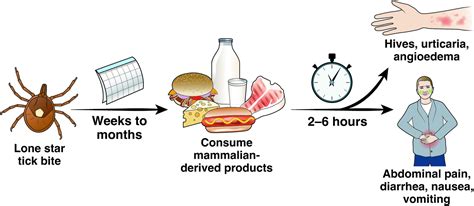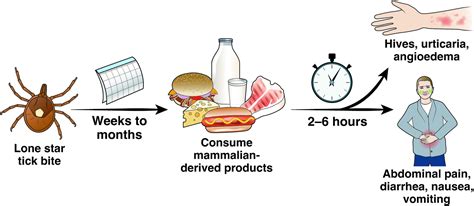Intro
Discover the meat allergy you never knew existed: Alpha-Gal Syndrome. Learn about this tick-borne condition that causes severe reactions to red meat, its symptoms, diagnosis, and treatment options. Understand the connection between tick bites, mammalian meat, and this unusual allergy, and how to manage it for a healthier life.
Alpha-Gal Syndrome is a type of food allergy that has gained significant attention in recent years due to its unusual symptoms and the growing number of reported cases. This condition is often referred to as a "meat allergy," but it's more complex than that. In this article, we'll delve into the world of Alpha-Gal Syndrome, exploring its causes, symptoms, diagnosis, and treatment options.
The Rise of Alpha-Gal Syndrome
Alpha-Gal Syndrome was first identified in 2009, and since then, the number of reported cases has been steadily increasing. According to the Centers for Disease Control and Prevention (CDC), Alpha-Gal Syndrome is a "recently identified type of food allergy" that has been reported in the United States, Australia, and Europe. The exact prevalence of Alpha-Gal Syndrome is still unknown, but it's estimated to affect thousands of people worldwide.

What is Alpha-Gal Syndrome?
Alpha-Gal Syndrome is an allergy to a type of sugar molecule called galactose-alpha-1,3-galactose (alpha-gal). This molecule is found in the meat of mammals, such as beef, pork, lamb, and venison. When people with Alpha-Gal Syndrome consume red meat, their immune system reacts to the alpha-gal molecule, triggering an allergic response.
Causes of Alpha-Gal Syndrome
The exact cause of Alpha-Gal Syndrome is still not fully understood, but research suggests that it may be linked to:
- Tick bites: Some studies have found a connection between tick bites and the development of Alpha-Gal Syndrome. It's thought that the tick's saliva may trigger an immune response to alpha-gal.
- Genetics: Alpha-Gal Syndrome may be more common in people with a family history of allergies or autoimmune disorders.
- Environmental factors: Exposure to certain environmental toxins or changes in gut bacteria may also contribute to the development of Alpha-Gal Syndrome.
Symptoms of Alpha-Gal Syndrome
The symptoms of Alpha-Gal Syndrome can vary from person to person, but common reactions include:
- Hives or itchy skin
- Swelling of the face, lips, or tongue
- Stomach cramps
- Diarrhea
- Vomiting
- Anaphylaxis (a severe, life-threatening allergic reaction)
Symptoms can occur within 3-6 hours after consuming red meat, but in some cases, they may be delayed by several hours or even days.
Diagnosing Alpha-Gal Syndrome
Diagnosing Alpha-Gal Syndrome can be challenging, as the symptoms are similar to those of other food allergies. A diagnosis is typically made through a combination of:
- Medical history: A thorough review of the patient's medical history, including any previous allergies or reactions to food.
- Physical examination: A physical examination to look for signs of an allergic reaction.
- Blood tests: Blood tests to measure the levels of IgE antibodies, which are responsible for triggering allergic reactions.
- Elimination diet: An elimination diet, where the patient avoids red meat for a period of time to see if symptoms improve.
Treatment Options for Alpha-Gal Syndrome
There is no cure for Alpha-Gal Syndrome, but treatment options are available to manage symptoms and prevent reactions. These include:
- Avoiding red meat: The most effective way to manage Alpha-Gal Syndrome is to avoid consuming red meat.
- Epinephrine injectors: For severe reactions, epinephrine injectors, such as EpiPens, may be prescribed.
- Antihistamines: Antihistamines, such as diphenhydramine, may be used to treat mild to moderate reactions.
Living with Alpha-Gal Syndrome
Living with Alpha-Gal Syndrome requires careful attention to diet and lifestyle. Here are some tips for managing the condition:
- Read food labels: Always read food labels to check for red meat ingredients.
- Ask questions: When eating out, ask questions about food ingredients and preparation methods.
- Carry an EpiPen: If prescribed, always carry an EpiPen with you in case of an emergency.
- Connect with others: Join online support groups or forums to connect with others who have Alpha-Gal Syndrome.

Preventing Alpha-Gal Syndrome
While there is no surefire way to prevent Alpha-Gal Syndrome, there are some steps you can take to reduce your risk:
- Avoid tick bites: Take steps to avoid tick bites, such as using insect repellent and wearing protective clothing.
- Eat a balanced diet: Eating a balanced diet that includes a variety of fruits, vegetables, and whole grains may help reduce the risk of developing Alpha-Gal Syndrome.
Conclusion
Alpha-Gal Syndrome is a complex condition that requires attention to diet and lifestyle. By understanding the causes, symptoms, and treatment options, individuals with Alpha-Gal Syndrome can manage their condition and prevent reactions. If you suspect you or a loved one may have Alpha-Gal Syndrome, consult with a healthcare professional for proper diagnosis and treatment.
What is Alpha-Gal Syndrome?
+Alpha-Gal Syndrome is a type of food allergy that occurs when the body reacts to a type of sugar molecule called galactose-alpha-1,3-galactose (alpha-gal), found in red meat.
What are the symptoms of Alpha-Gal Syndrome?
+Common symptoms of Alpha-Gal Syndrome include hives, itching, swelling, stomach cramps, diarrhea, vomiting, and anaphylaxis.
How is Alpha-Gal Syndrome diagnosed?
+Diagnosis is typically made through a combination of medical history, physical examination, blood tests, and an elimination diet.
Is there a cure for Alpha-Gal Syndrome?
+There is no cure for Alpha-Gal Syndrome, but treatment options are available to manage symptoms and prevent reactions.
Can Alpha-Gal Syndrome be prevented?
+While there is no surefire way to prevent Alpha-Gal Syndrome, avoiding tick bites and eating a balanced diet may reduce the risk.
We hope this article has provided you with a comprehensive understanding of Alpha-Gal Syndrome. If you have any further questions or concerns, please don't hesitate to reach out to a healthcare professional.
